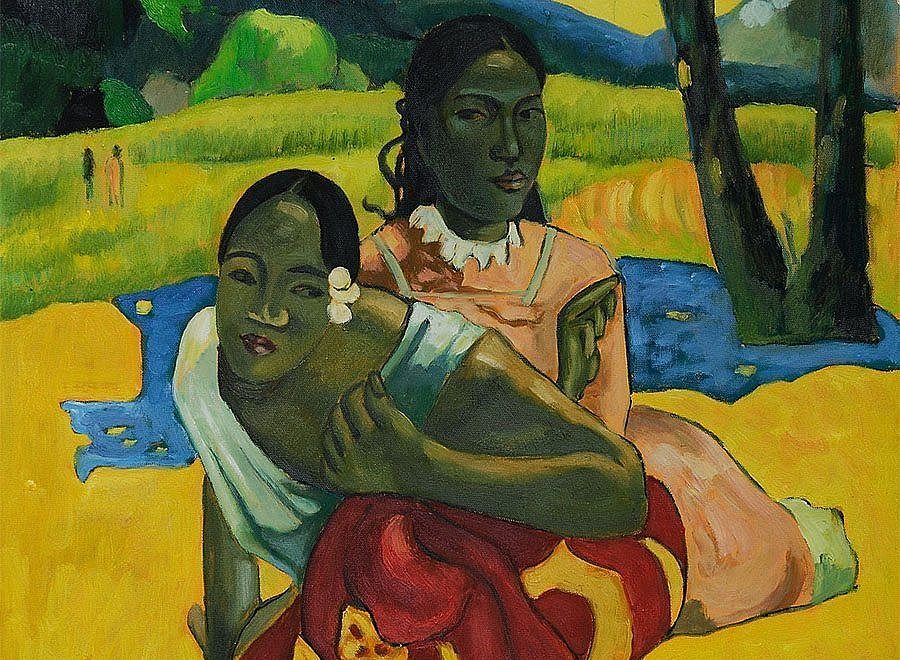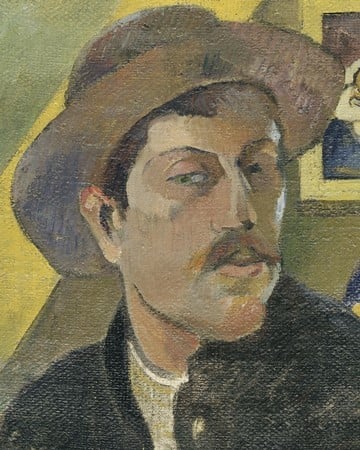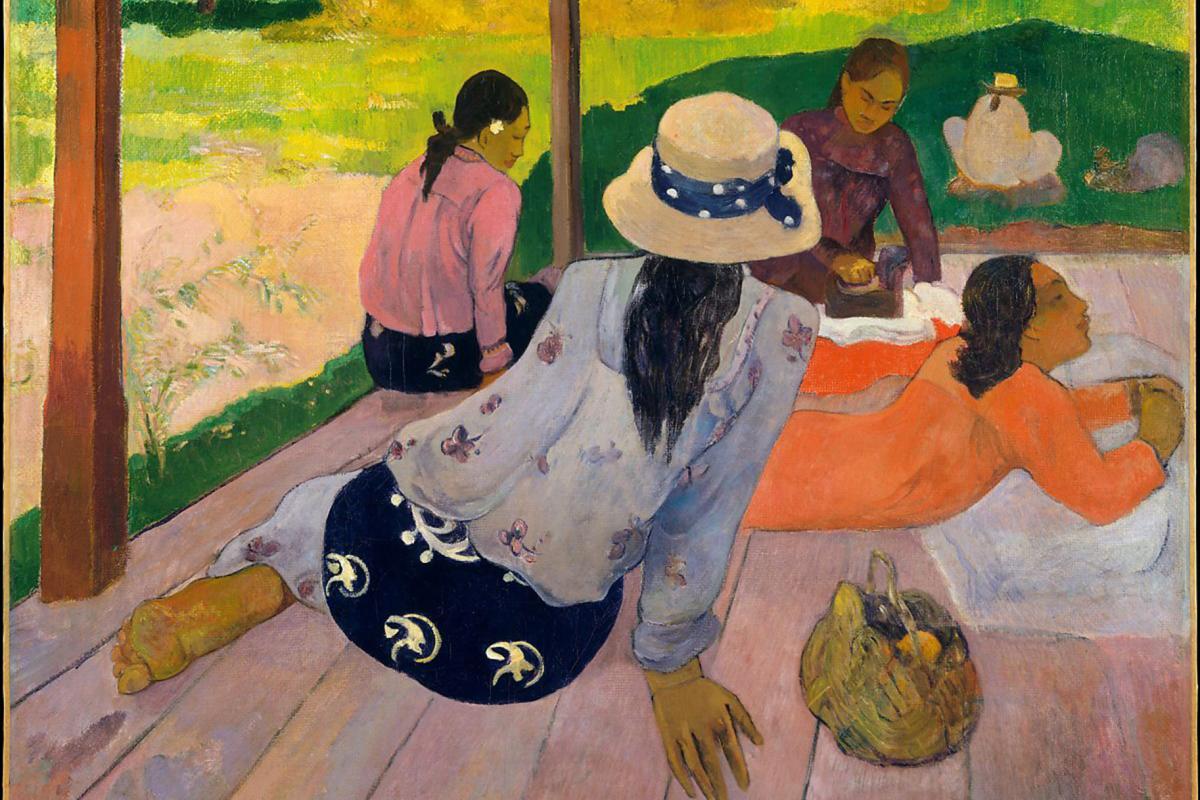Paul Gauguin was a bit of a dick
At the age of twenty-three he lucked into a cushy job at the Paris Bourse (France’s stock exchange). A friend of the family had organised it for him and it paid a good salary. Paul was quick to get the hang of trading and turned out to be quite an astute stockbroker. The job served him well. He became quite well off.
During this time he also met and married a Danish woman, Mette-Sophie Gad, and together they had five children. Everything was going ‘real swell’.
In his spare time, Paul was even able to paint a little too. It wasn’t much more than a hobby at this point, but he managed to sell the odd piece to Paris collectors. That said, his paintings were considered a bit…well, a bit crap. But Paul didn’t seem to mind the bad reviews, so long as people took them off his hands.
Life carried on like this for eleven years. All good. But in 1882 things took a sharp turn for the worse. This is when Paul became a bit of a dick. But at the same time, how he reacted to what happened next can teach us something very important about how to win, no matter what others think.

A shock to the system
As stock markets have a tendency to do, in France in 1882, they decided to crash.
Financial crashes are never good, especially for those, like Paul, whose income is directly linked to the markets. Indeed, Paul is hit hard, his earnings take a nosedive and his job is thrown into doubt.
At this point, essentially faced with redundancy, most of us would look to find a new job along similar lines to what we were doing before.
We’d naturally panic about how to pay the bills, question our financial security and look to spend time with the family to remind ourselves money is one thing, but the love and care of those close to you is a whole different kettle of fish.
Not Paul. No. Paul decides to do something different. Paul decides to do something many would consider ill advised, idealistic and quite possibly thoughtless. Paul decides to become an artist.
Desire trumps talent
Of course, it’s worth noting in his lifetime Gauguin didn’t achieve much fame. In fact, he was pretty unhappy with how things played out.
So, it’s not the ideal blueprint for a creative person to follow by any stretch of the imagination. But there is one key element we can take from Gauguin’s story that will serve you well when it comes to overcoming the insecurity we feel when we don’t seem to be ‘winning’ as often as everyone else is.
You see, what’s interesting about our redundant Parisian stockbroker is at his lowest moment, instead of seeking similar employment, questioning the very idea of so called 'job security' or finding solace in his loved ones…

Paul doubled-down on the one thing he was bad at. A middle-aged, out-of-work-stockbroker, with a wife and five children makes the decision to become a painter at all costs. It’s like Paul Hollywood discovering the bottom’s gone out of baking and instead of getting a job at Tesco – he becomes a poet.
Despite all evidence to the contrary, Paul thinks he can make it in a field he’s been proven to be a non-runner. In fact, he doesn’t just think he can make it: he’s convinced he’ll find wealth and glory. He believes he can win – big time. Kudos his wife Mette for not leaving him there and then.
It plays out the family move around together for a while as Paul pursues his new passion. But as nothing really sticks – and, most importantly, the money isn’t coming in – things get strained.
After moving back to Mette’s homeland of Copenhagen, she eventually suggests Paul go back to Paris. She’s had enough. Paul is so far gone on his renounce-everything-become-a-painter groove that she can’t deal with it. Fair enough, I say.
What does Paul do now? Despite being almost down and out, he’s still not dissuaded from chasing his dream. It’s a single-mindedness that we can’t help but admire.
To cast off what society says you should do and pursue your ideas all guns blazing.
Show me someone who doesn’t wish – somewhere deep inside – they could do this and I’ll show you a liar.
A little stubbornness goes a long way
The way Gauguin believed in his creative powers was startling in its selfishness, yet it speaks to something inside us all. Whatever others think of your ideas, to win the day – you must be stubborn in your self-belief. This is Gauguin’s lesson to us.
Before he made the decision to seek a living from painting full time, his talent had been deemed lacking. The gatekeepers of the day turned him away and dropped the latch.
But Gauguin didn’t give a monkey’s. His decision was irrational, flew in the face of common sense and would ultimately lead to estranging himself from his wife and family. But his decision does celebrate one very simple idea... and it’s something I would encourage you to take to heart.
If you ever sit and wonder whether you’re right to keep pitching your crazy copy ideas to the boss...
If you ever wonder whether you should keep on with those designs others deem to be too ‘out there’…
Or if you ever wonder whether it’s worth carrying on with the first chapter of that novel you’ve been picking at for three years now...
The answer is yes.
Believe in your ability to be creative. Believe in your ability to win.
And believe that sometimes, even when it seems you’ve got no chance, you’ve just got to take a leaf out of Gauguin’s book and go for it anyway.
This article was taken from issue 1 of Marketing Society members-only publication EMPOWER. Find out more here and see past articles here (please note some articles are open to the public and some are for members only.)



